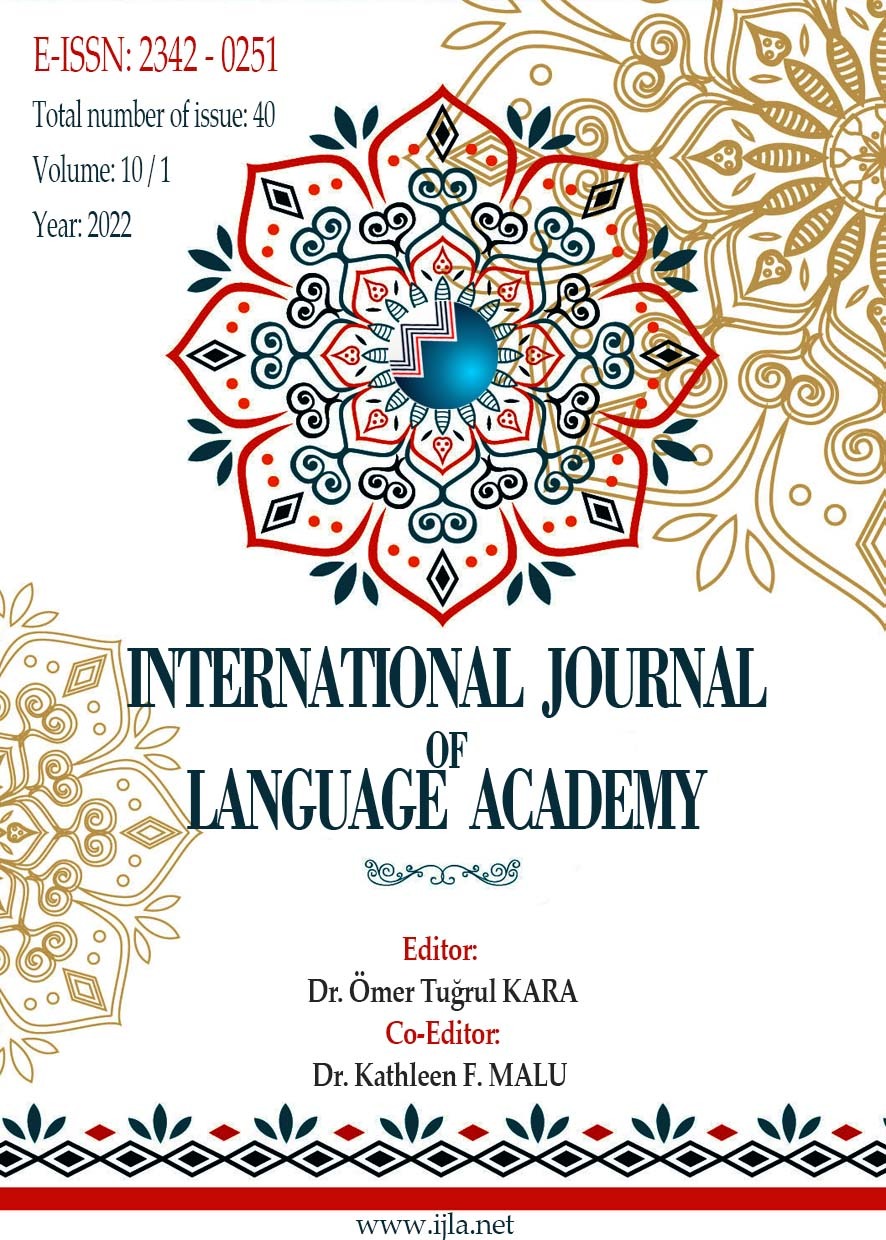PERFORMATIVE KOMPETENZ ALS INTEGRATIVE KOMPETENZART ANGESICHTS DER TRANSLATIONSDIDAKTIK: VERSUCH EINER THEORETISCHEN ARGUMENTATION
Author :
Abstract
Translationsdidaktik ist bekanntlich nicht nur ein akademisches Bildungsmodell, sondern auch eine berufliche Ausbildung. Vor diesem Hintergrund werden Studierende/ angehende Übersetzer und Dolmetscher in der Translationsdidaktik an Universitäten zu Kommunikationsspezialisten ausgebildet, die fachlich korrekte Texte auf mündlicher und schriftlicher Ebene verfassen können. Fachkompetenzen im Bereich der Kommunikation hingegen setzen voraus, dass die in der Ausbildung erworbenen Kenntnisse und Fähigkeiten miteinander verknüpft und auf konkrete Praxissituationen angewendet werden. Der an dieser Stelle als Schlüsselbegriff hervortretende Begriff der ‚performativen Kompetenz‘ weist auf eine Ausstattung hin, die die praxisorientierten Kenntnisse und Fähigkeiten der Studierenden/ angehenden Translatoren einbezieht. In dieser Studie wird dieser Ausstattungsbereich definiert, der theoretische Hintergrund dieses Bereichs untersucht und versucht, das Konzept hinsichtlich der Translationstheorie zu begründen. In der Forschung wurde argumentiert, dass der Begriff der performativen Kompetenz auf der handlungsorientierten Perspektive in translationstheoretischen Studien basieren könnte, und diese Grundannahme wurde durch einen deskriptiven Umgang mit den in dieser Perspektive positionierten Theoretikern bearbeitet. Als Konsequenzen aus der vorliegenden Studie ist es gezeigt, dass ‚handlungsorientierte’ Ansätze in der Translationswissenschaft eine einzigartige Kategorie darstellen. In diesem Zusammenhang hat sich in einem akademischen Übersetzungsausbildungsmodell, das das Verhältnis von Theorie und Praxis berücksichtigt, herauskristallisiert, dass ‚performative Kompetenz’ als ein Konzept, das sich auf die Kommunikationsfähigkeit von Translatoren bezieht, eines der zu entwickelnden Wissens- und Kompetenzfelder sein kann.
Keywords
Abstract
As it is known, translator training is not only an academic education model but also a vocational education. In the light of this purpose, students / prospective translators are trained to be communication specialists who can produce qualified translations at the oral and written level in the translation education given by universities. Communication expertise, on the other hand, requires the knowledge and skills acquired during the training to be associated with each other and applied to concrete application situations. The concept of 'performative competence', which emerges as a key concept at this point, indicates an equipment that includes the practice-oriented knowledge and skills of students / translator candidates. In this study, this equipment area will be defined, the theoretical background of this area will be examined, and the concept will be tried to be justified in the light of translation theory. In the research, it was argued that the concept of performative competence could be based on the 'action' oriented perspective in translation-theoretical studies, and this basic assumption was processed through descriptive handling of the theorists positioned in this perspective. At the end of the analysis, it was revealed that 'action'-oriented approaches in translation studies constitute a unique category. In this respect, in an academic translation education model that considers the relationship between theory and practice, it has emerged that 'performative competence', as a concept that refers to the communication skills of translators, can be one of the fields of knowledge and skills that need to be developed.
Keywords
- Akalın, R. (2018). Çeviri Kuramından Çeviri Eğitimine: Akademik Çeviri Eğitiminin Temel İlkelerini Belirleme. Ankara: Nobel Akademik Yayıncılık.
- Ammann, M. (1995). Kommunikation und Kultur: Dolmetschen und Übersetzen heute. Eine Einführung für Studierende. Berlin: Iko Verlag
- EMT-Expertengruppe (2009). Kompetenzprofil von Translatoren, Experten für die mehrsprachige und multimediale Kommunikation. https://ec.europa.eu/info/sites/default/files/emt_competences_translators_de.pdf
- Holmes, J. (1987). The name and nature of translation studies. Indian Journal of Applied Linguistics, XIII (2), 9-24.
- Holz-Mänttäri, J. (1984). Translatorisches Handeln. Theorie und Methode. Helsinki: Suomalainen Tiedeakatemia
- Hönig, H. and Kußmaul, P. (1982). Strategie der Übersetzung. Ein Lehr- und Arbeitsbuch. Tübingen: Narr
- Hönig, H. G. (2011). Übersetzen lernt man nicht durch Übersetzen: Ein Plädoyer für eine Propädeutik des Übersetzens. Susanne Hagemann (Hrsg.): Hans G. Hönig. Übersetzen lernt man nicht durch Übersetzen. Berlin: Saxa Verlag, 59-72
- Kautz, U. (2000). Handbuch Didaktik des Übersetzens und Dolmetschens. München: Iudicium.
- Kiraly, D. (2013). Das Kultivieren einer Translationsdidaktik – Eine fraktale Perspektive. Silvia Hansen-Schirra, Donald Kiraly (Hrsg.): Projekte und Projektionen in der translatorischen Kompetenzentwicklung (=Publikationen des Fachbereichs Translations-, Sprach- und Kulturwissenschaft der Johannes-Gutenberg-Universität Mainz in Germersheim. Reihe A: Abhandlungen und Sammelbände. 61). Frankfurt am Main: Peter Lang, 11–32.
- Nord, C. (1989). Textanalyse und Übersetzungsauftrag. Frank G. Königs (Hrsg): Übersetzungswissenschaft und Fremdsprachenunterricht. Neue Beiträge zu einem alten Thema. München: Goethe-Institut, 95-119
- Nord, C. (1993): Einführung in das funktionale Übersetzen. Am Beispiel von Titeln und Überschriften. Tübingen: Francke (UTB 1734)
- PACTE (2007). Zum Wesen der Übersetzungskompetenz – Grundlagen für die experimentelle Validierung eines ÜK-Modells. G. Wotjak (Hrsg.): Quo vadis translatologie? Ein halbes Jahrhundert universitäre Ausbildung von Dolmetschern und Übersetzern in Leipzig; Rückschau, Zwischenbilanz und Perspektive aus der Außensicht. Berlin: Frank & Timme, 327–342.
- Reiß, K. and Vermeer, H. J. (1991). Grundlegung einer allgememeinen Translationstheorie. 2. Auflage. Tübingen: Max Niemeyer Verlag.
- Risku, H. (1998). Translatorische Kompetenz: Kognitive Grundlagen des Übersetzens als Expertentätigkeit. Tübingen: Stauffenberg Verlag.
- Sandrini, P. (2014). Translationskompetenz und Ausbildung: Globalisierung, Technologie, Beruf. Zybatow, L.; Ustazweski, M. (eds.) Bausteine translatorischer Kompetenz oder was macht Übersetzer und Dolmetscher zu Profis. Innsbrucker Ringvorlesung zur Translationswissenschaft 7. Frankfurt a. M.: Peter Lang, 17-30.
- Vermeer, H. (1986). Übersetzen als kultureller Transfer. Mary Snell- Hornby (Hrsg): Übersetzungswissenschaft- Eine Neuorientierung. Zur Integrierung von Theorie und Praxis. Tübingen – Basel: UTB 1915, 30-53
- Wilss, W. (1992). Übersetzungsfertigkeit. Annäherungen an einen komplexen übersetzungspraktischen Begriff. Tübingen: Gunter Narr Verlag





